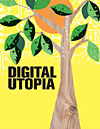Digital utopia
“The new Internet boom commonly referred to as Web 2.0 is really an exercise in digital democracy,” he writes.
“Dubbed Digital Utopians by some, and Web 2.0 innovators by others, this latest wave of tech gurus champion community over commerce, sharing ideas over sharing profits. By using Web sites that stress group thinking and sharing, these Internet idealists want to topple the power silos of Hollywood, Washington, Wall Street and even Silicon Valley. And like countless populists throughout history, they hope to disperse power and control, an idea that delights many and horrifies others.”
“The core of the Web 2.0 movement resurrects an age-old debate about governance and democracy, one that was argued by political philosophers such as Jean-Jacques Rousseau and Alexis de Tocqueville: Are the benefits of democracy — taking advantage of what Web 2.0 proponents call the wisdom of the crowds — worth risking the dark side of mob rule?”
Fost realises that the Web 2.0 movement is not without its share of critics.
“Andrew Keen warns against the dangers of embracing technology’s level playing field. Keen, 46, a former professor and philosopher turned tech entrepreneur, published a tract this year, ‘Web 2.0 Is Reminiscent of Marx‘, and is working on a book lambasting ‘The Cult of the Amateur‘.”
“Keen dismisses what he calls the ‘militant and absurd’ buzzwords of Web 2.0: Empowering citizen media, radically democratize, smash elitism, content redistribution, authentic community.”
In his article Fost traces the notion of digital utopia back to the early days of computing, in particular the liberal politics of the 1960s anti-war and civil rights movements, arguing that “underpinning the technology movement has always been a sense of community.”. He then goes on to describe how utopians today organise themselves, but also how in the end business always takes over.
Similar warnings for realism come from Aleks Krotoski in an opinion piece in The Guardian, while reviewing the book “The Victorian Internet” by Tom Standage, who is the technology editor of The Economist.
Standage argues that today’s ‘electronic superhighway; is the heir to the more revolutionary 19th-century ‘highway of thought’. Like today’s utopians, the telegraph’s development was accompanied by cries that it would hold the answer to human fraction and foible. But in the end it was unable to stop the advance of the 20th century, economic downturn and its own inevitable downfall. It only helped spread the news faster.”
Discussing user-generated content, Krotoski writes “these spaces are increasingly being taken over by London stock exchange traders with agendas. Viva which revolution?”
– Read article by Dan Fost (San Francisco Chronicle)
– Read article by Alex Krotoski (The Guardian)




